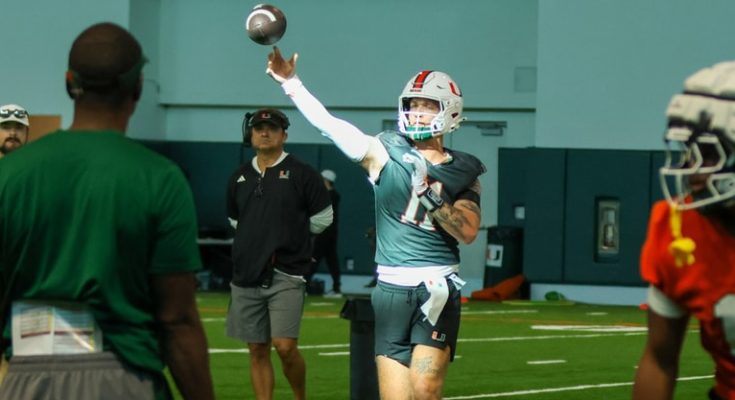**Carson Beck Reveals Stark Differences Between Mario Cristobal and Kirby Smart’s Practice Styles and Philosophies**
Georgia quarterback Carson Beck has experienced two distinct coaching philosophies during his college career, playing under both Mario Cristobal at Miami and Kirby Smart at Georgia. In a recent interview, Beck shed light on the stark contrasts between the two head coaches’ approaches to practice, player development, and overall team culture. His insights provide a fascinating glimpse into how different coaching styles can shape a program’s success—or struggles.
At Georgia, Beck described practices under Kirby Smart as highly structured, intense, and meticulously detailed. Smart, a former Nick Saban disciple, emphasizes precision, discipline, and competition in every drill. According to Beck, there’s no room for complacency—every rep is treated like a game situation.
“Coach Smart runs practices with an NFL mentality,” Beck explained. “Everything is timed, everything is competitive. If you’re not performing at your best, you’re getting passed up. There’s no ‘off’ day.”
One of the defining features of Smart’s practices is the constant emphasis on physicality and accountability. Players are expected to execute at a high level in every drill, and the coaching staff doesn’t hesitate to call out mistakes immediately. Beck noted that Smart’s attention to detail extends even to the smallest aspects of practice, from footwork to route timing.
“He’ll stop a drill if a receiver’s release isn’t perfect,” Beck said. “It’s not just about completing the pass—it’s about doing everything the right way, every single time.”
This relentless focus on fundamentals has been a cornerstone of Georgia’s back-to-back national championships. Smart’s practices are designed to simulate game pressure, ensuring that players are mentally and physically prepared for any situation.
In contrast, Beck described Mario Cristobal’s practice style at Miami as more traditional, with a heavy emphasis on physicality and toughness. Cristobal, a former offensive lineman, brings a blue-collar mentality to his coaching, prioritizing hard-nosed football above all else.
“Coach Cristobal’s practices are tough—really tough,” Beck said. “There’s a lot of hitting, a lot of conditioning. He wants to build a team that can out-physical anyone.”
While Cristobal’s approach instills toughness, Beck hinted that it sometimes lacked the same level of strategic depth as Smart’s system. At Miami, practices often revolved around establishing a dominant run game and wearing down opponents, which occasionally came at the expense of refining the passing attack.
“We ran the ball a ton in practice, and that’s great for building an identity,” Beck said. “But at Georgia, there’s more balance. We work on everything—play-action, quick game, deep shots—because Coach Smart wants us prepared for any defensive look.”
Another key difference Beck highlighted was the way mistakes were addressed. While Smart corrects errors with immediate feedback and film study, Cristobal’s corrections often came in the form of extra conditioning or physical consequences.
“At Miami, if you messed up, you might be doing up-downs or gassers,” Beck recalled. “At Georgia, you’re more likely to get pulled aside and coached up on the spot.”
Beyond practice structure, Beck pointed out the philosophical differences in how the two coaches develop players. Smart’s program is built around constant competition, where no starting job is guaranteed. Even established stars must prove themselves daily, fostering an environment where complacency is impossible.
“At Georgia, you earn your spot every single day,” Beck said. “There’s no favoritism. If you’re not performing, the next guy is ready to take your place.”
Cristobal, meanwhile, tends to trust his veterans and established players, sometimes sticking with them longer even if younger talent is pushing for playing time. Beck suggested this approach can create stability but may also slow the development of emerging stars.
“Coach Cristobal is loyal to his guys, which is great for morale,” Beck said. “But at Georgia, the best player plays, no matter what. That keeps everyone hungry.”
The differences in coaching styles have had clear impacts on each program’s success. Under Smart, Georgia has become a perennial national title contender, with a well-rounded, disciplined team that excels in all phases. Cristobal, meanwhile, has faced criticism for Miami’s inconsistency, particularly in close games where attention to detail becomes crucial.
Beck’s observations suggest that while Cristobal’s emphasis on toughness can build a strong foundation, Smart’s combination of physicality, precision, and adaptability gives Georgia an edge in high-stakes games.**
Ultimately, Beck’s insights reveal that both Cristobal and Smart are highly effective coaches—just in different ways. Cristobal’s old-school, physical approach can mold tough, resilient teams, while Smart’s NFL-style practices create a well-oiled machine capable of adjusting to any challenge.
For Beck, experiencing both systems has been invaluable. “I’ve learned so much from both coaches,” he said. “But the biggest thing I’ve taken from Georgia is that championships are won by doing the little things right—every single day.”
As Beck prepares for the NFL, his time under these two contrasting philosophies has undoubtedly shaped him into a more complete quarterback. And for fans and analysts, his breakdown offers a rare look at how coaching styles can make or break a program’s trajectory.



